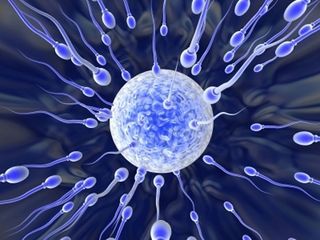Male Birth Control Treatment Could Focus on Sperm Proteins, Not Hormones

A male form of "the pill" has stymied researchers for years, but now a new study finds that such male birth control may be possible by blocking a single protein in sperm cells.
In a mouse study, the researchers focused on a protein called calcineurin, which is found in the sperm-producing cells of the testes as well as other cells in the body.
The researchers genetically engineered mice so that they lacked a gene that makes part of the calcineurin protein but is activatedonly in sperm-producing cells. When these mice had sex, they were infertile, the researchers said. (This genetic engineering experiment was done as a proof of concept, to show that this gene affects sperm,)
In a separate experiment, the researchers treated the mice with two drugs that block calcineurin, called cyclosporine A and FK506. Both of these drugs are already used in patients who've had organ transplants to suppress the immune system and prevent the organ from being rejected by the body.
After about four to five days of treatment, the mice developed defects in their sperm and became infertile. But once the treatment was stopped, these defects went away, and the mice were fertile again within a week.
"Considering these results in mice, sperm calcineurin may be a target for reversible and rapidly acting human male contraceptives," the researchers, from Osaka University in Japan, wrote in the Oct. 1 issue of the journal Science Express. The researchers noted that human sperm also contain the calcineurin protein, and that part of the protein is specific to sperm. [Sexy Swimmers: 7 Facts About Sperm]
When the researchers tried to figure out why their genetically engineered mice were infertile, they found that the mice's sperm cells did not swim well and were not able to fertilize eggs. Further experiments found that themidpieces of these sperm didn't bend normally, which prevented the sperm from penetrating the membrane of an egg.
Sign up for the Live Science daily newsletter now
Get the world’s most fascinating discoveries delivered straight to your inbox.
However, because the study was conducted in mice, it's not clear if the findings will translate to humans. In a small, previous study of nine men who took cyclosporine A after a kidney transplant, researchers found that three of the four men who attempted to have children were successful. But other studies in men have suggested that cyclosporine A does affect sperm movement.
Patricia Morris, director of biomedical research at the New York-based nonprofit research organization Population Council, said that calcineurin is an interesting target for a male contraceptive because it is not a hormone. Approaches to male contraception that target hormones can affect sex drive and thus are less desirable as contraceptives, said Morris, who was not involved in the new study in mice.
"We certainly need male contraceptives, and new designs that aren't hormone-based are really welcomed in terms of acceptability," Morris said.
In addition, targeting a protein that's found only in sperm would theoretically eliminate the possibility of side effects in other tissues, Morris told Live Science.
"The holy grail of any drug development is, you want it to be specific," Morris said. "And that's what makes [this] such an enticing, kind of exciting prospect."
Follow Rachael Rettner @RachaelRettner. Follow Live Science @livescience, Facebook & Google+. Original article on Live Science.

Rachael is a Live Science contributor, and was a former channel editor and senior writer for Live Science between 2010 and 2022. She has a master's degree in journalism from New York University's Science, Health and Environmental Reporting Program. She also holds a B.S. in molecular biology and an M.S. in biology from the University of California, San Diego. Her work has appeared in Scienceline, The Washington Post and Scientific American.